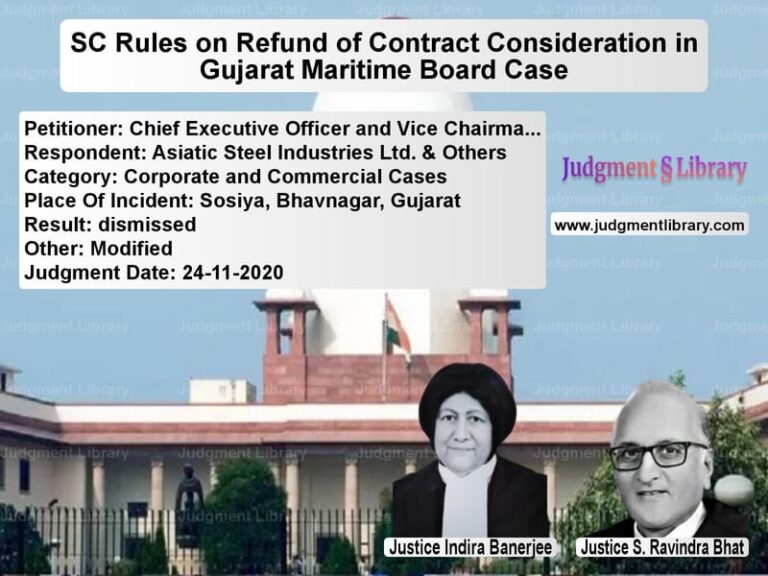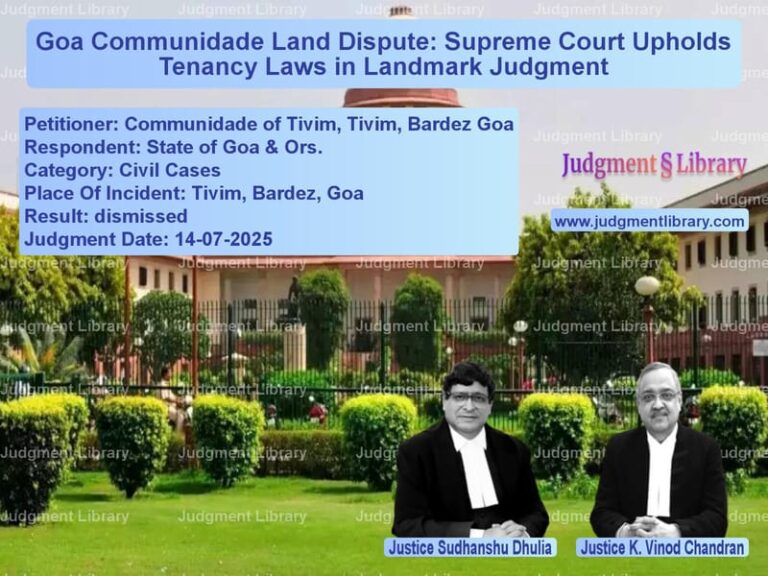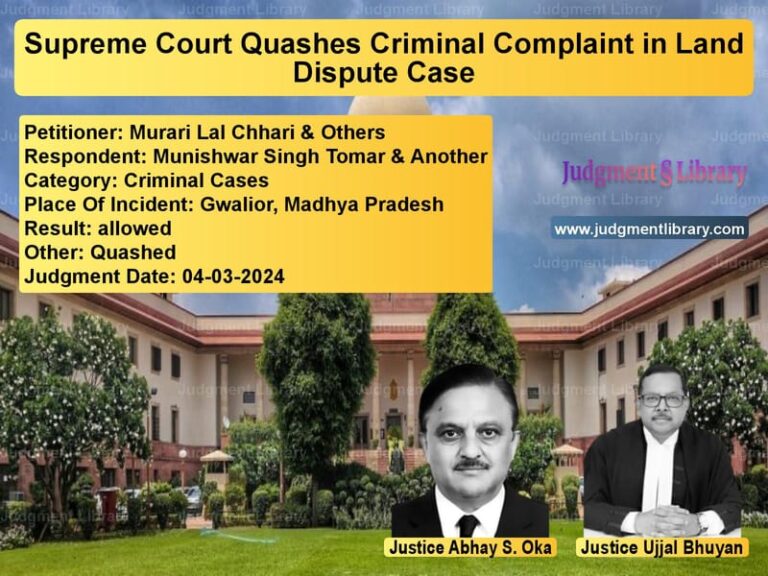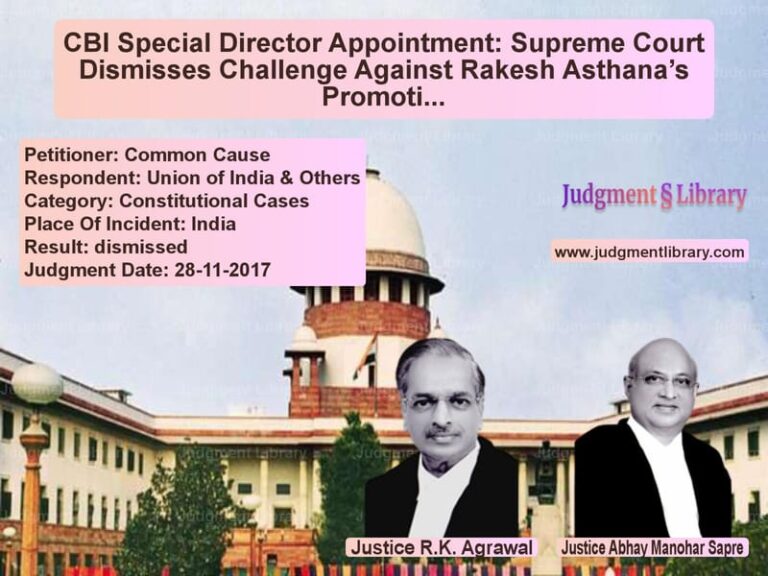Quashing of Criminal Process in Pharmaceutical Case: Legal Precedents and Application of Section 34
This criminal appeal arises out of a challenge to the judgment and order passed by the Bombay High Court. The appellants, Lalankumar Singh & Ors., sought to quash the summons issued against them by the Chief Judicial Magistrate (CJM), Beed, in connection with the manufacturing of substandard ‘Hemfer Syrup’ by their company, M/s Cachet Pharmaceuticals Pvt. Ltd. The primary issue in this appeal was whether the appellants, as directors of the company, could be held vicariously liable for the alleged substandard quality of the drug under Section 34 of the Drugs and Cosmetics Act, 1940 (the said Act). The appellants argued that there was no specific averment in the complaint about their individual roles in the manufacturing process, and thus, the issuance of process against them was unjustified.
Background:
The appellants were the directors of M/s Cachet Pharmaceuticals Pvt. Ltd., which was granted permission to manufacture Hemfer Syrup, a drug regulated under Schedule C & C(1) to the Drugs and Cosmetics Rules, 1945. In August 2006, a Drugs Inspector purchased a sample of Hemfer Syrup, which was later tested and found to be of substandard quality due to the cyanocobalamin content being below the permissible limit. Despite this, the appellants contested the issuance of summons on the grounds that the complaint lacked sufficient details of their involvement in the alleged offense. The issue of vicarious liability, as specified under Section 34 of the Act, formed the crux of the case.
The appellants had requested that the proceedings against them be quashed, asserting that there was no evidence that they were in charge of the day-to-day affairs of the company or responsible for the manufacturing process. The respondents, however, argued that as directors, the appellants were vicariously liable for the actions of the company under the said Act, and thus, the issuance of process was justified. The learned CJM and the Sessions Court rejected the appellants’ petition, which was subsequently challenged before the Supreme Court.
Appellant’s Arguments:
The appellants, represented by senior counsel Shri C.U. Singh, argued that under Section 34 of the Drugs and Cosmetics Act, a person could only be held criminally liable if they were in charge of and responsible for the conduct of the business at the time the offense was committed. They contended that merely being directors of the company was insufficient to establish vicarious liability. The appellants also pointed out that the complaint lacked any specific averment regarding their individual roles in the manufacturing process, which made the case against them legally unsustainable. Furthermore, they argued that the Magistrate failed to apply his mind before issuing the summons, which violated the principle of fair judicial process.
The appellants further submitted that the complaint did not provide sufficient evidence of their involvement in the alleged criminal activity. The defense argued that while the complaint stated that the appellants were directors, it did not specify their role in the actual manufacturing of the substandard drug. In the absence of such evidence, they contended that the issuance of process against them should be quashed.
Respondent’s Arguments:
The respondents, represented by Shri Siddharth Dharmadhikari, countered that the appellants, as directors, were responsible for the day-to-day affairs of the company and its compliance with the Drugs and Cosmetics Rules. They argued that the complaint contained sufficient details about the company’s operations and that the appellants were vicariously liable for the substandard quality of the drug. The respondents relied on Section 34 of the Act, which presumes the liability of persons in charge of the business at the time the offense is committed, and argued that the directors’ knowledge of the company’s operations made them liable.
The respondents also asserted that the appellants’ failure to contest the quality of the drug, despite being notified about the test results, demonstrated their involvement in the alleged offense. They emphasized that Section 34 applies not only to managing directors but also to directors who have substantial control over the operations of the company, including manufacturing processes.
Court’s Analysis:
The Supreme Court examined the applicability of Section 34 of the Drugs and Cosmetics Act, which deals with offenses committed by companies and prescribes vicarious liability for persons in charge of and responsible for the conduct of the company. The Court noted that merely being a director does not automatically make an individual liable under the section. The Court referred to various precedents, including the cases of State of Haryana v. Brij Lal Mittal and others and S.M.S. Pharmaceuticals Ltd. v. Neeta Bhalla and others, to emphasize that specific averments must be made to show the individual’s role in the offense.
The Court also referred to its earlier judgments, which clarified that for a director to be held vicariously liable, there must be a clear statement of how and in what manner the director was responsible for the conduct of the company’s business at the time of the alleged offense. The Court found that in the present case, the complaint did not provide such specifics regarding the appellants’ individual roles. As a result, the Court held that the proceedings against the appellants were flawed and lacked the necessary legal basis for vicarious liability.
Judgment:
The Supreme Court allowed the appeal and quashed the order of the learned CJM, Beed, as well as the decision of the Sessions Court. The Court held that the complaint against the appellants lacked sufficient averments to establish their role in the manufacturing process and, therefore, could not proceed. The Court emphasized the need for specific averments in the complaint regarding the directors’ involvement in the offense, in line with Section 34 of the Drugs and Cosmetics Act. The proceedings against the appellants were dismissed, although the case against the other accused continued.
Conclusion:
This case reinforces the principle that vicarious liability for offenses committed by a company cannot be imposed on directors without specific allegations regarding their involvement in the offense. The judgment highlights the importance of ensuring that criminal liability is not extended to individuals based solely on their designation as directors, but rather on their actual role and responsibility in the company’s operations. The decision also underscores the need for a clear and detailed complaint to establish the grounds for prosecuting individuals under criminal law, particularly in corporate settings.
Petitioner Name: Lalankumar Singh & Ors..Respondent Name: State of Maharashtra.Judgment By: Justice B.R. Gavai, Justice C.T. Ravikumar.Place Of Incident: Beed, Maharashtra.Judgment Date: 10-10-2022.
Don’t miss out on the full details! Download the complete judgment in PDF format below and gain valuable insights instantly!
Download Judgment: lalankumar-singh-&-o-vs-state-of-maharashtra-supreme-court-of-india-judgment-dated-10-10-2022.pdf
Directly Download Judgment: Directly download this Judgment
See all petitions in Murder Cases
See all petitions in Fraud and Forgery
See all petitions in Theft and Robbery Cases
See all petitions in Judgment by B R Gavai
See all petitions in Judgment by C.T. Ravikumar
See all petitions in allowed
See all petitions in supreme court of India judgments October 2022
See all petitions in 2022 judgments
See all posts in Criminal Cases Category
See all allowed petitions in Criminal Cases Category
See all Dismissed petitions in Criminal Cases Category
See all partially allowed petitions in Criminal Cases Category







